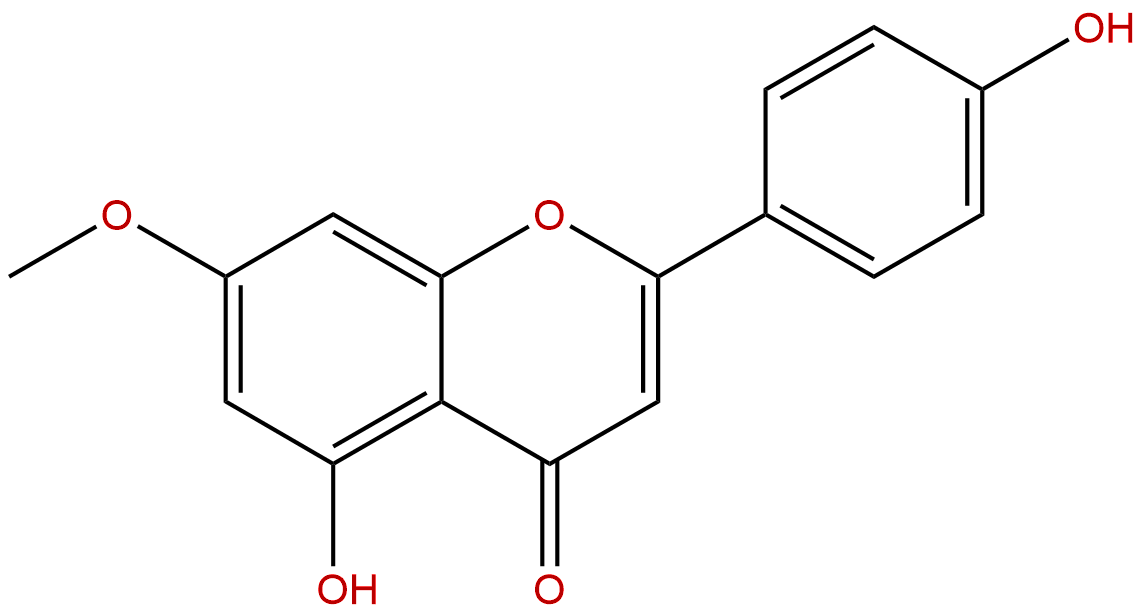
GenkwaninCAS No.:437-64-9
|
||||||||||
 |
|
|
||||||||

| Catalogue No.: | BP0636 |
| Formula: | C16H12O5 |
| Mol Weight: | 284.267 |
Product name: Genkwanin
Synonym name: Apigenin 7-methyl ether; Puddumetin
Catalogue No.: BP0636
Cas No.: 437-64-9
Formula: C16H12O5
Mol Weight: 284.267
Botanical Source: Daphne genkwa Sieb. et Zucc.
Physical Description:
Type of Compound: Flavonoids
Purity: 95%~99%
Analysis Method: HPLC-DAD or/and HPLC-ELSD
Identification Method: Mass, NMR
Packing: Brown vial or HDPE plastic bottle
Storage: Store in a well closed container, protected from air and light. Put into refrigerate or freeze for long term storage.
Whenever possible, you should prepare and use solutions on the same day. However, if you need to make up stock solutions in advance, we recommend that you store the solution as aliquots in tightly sealed vials at -20℃. Generally, these will be useable for up to two weeks.
The product could be supplied from milligrams to grams
Inquire for bulk scale.
Description:
Genkwanin has antitumor, and anti-inflammatory activities, it enhances host immunity, decreases the inflammatory cytokine levels, and regulates the miR-101/MKP-1/MAPK pathway.Genkwanin may have anti-skin ageing activity, it can up-regulate the transcriptional activation of human type vii collagen gene promoter, stimulating the formation of anchoring fibrils at the basement membrane zone in skin contributed to preventing skin ageing; it also induces a decrease of melanin synthesis by inhibiting tyrosinase activity, it could as skin whitening agent in cosmetic preparations.
References:
PLoS One. 2014 May 6;9(5):e96741.
Genkwanin inhibits proinflammatory mediators mainly through the regulation of miR-101/MKP-1/MAPK pathway in LPS-activated macrophages.
Genkwanin is one of the major non-glycosylated flavonoids in many herbs with anti-inflammatory activities. Although its anti-inflammatory activity in vivo has been reported, the potential molecular mechanisms remain obscure.
METHODS AND RESULTS:
In this study, by pharmacological and genetic approaches, we explore the anti-inflammatory effects of Genkwanin in LPS-activated RAW264.7 macrophages. Genkwanin potently decreases the proinflammatory mediators, such as iNOS, TNF-α, IL-1β and IL-6, at the transcriptional and translational levels without cytotoxicity, indicating the excellent anti-inflammatory potency of Genkwaninin vitro. Mechanism study shows that Genkwanin significantly suppresses the p38- and JNK-mediated AP-1 signaling pathway and increases the mitogen-activated protein kinase (MAPK) phosphatase 1 (MKP-1) expression at the posttranscriptional level. We also confirmed that microRNA-101 (miR-101) is a negative regulator of MKP-1 expression. Moreover, regardless of miR-101-deficient cells or miR-101-abundant cells, the suppression effects of Genkwanin on supernatant proinflammatory mediators' levels are far less than that in respective negative control cells, suggesting that Genkwanin exerts anti-inflammatory effect mainly through reducing miR-101 production. However, Genkwanin can't affect the level of phospho-Akt (p-Akt), indicating that the phosphorylation of Akt may be not responsible for the effect of Genkwanin on miR-101 production.
CONCLUSIONS:
We conclude that Genkwanin exerts its anti-inflammatory effect mainly through the regulation of the miR-101/MKP-1/MAPK pathway.
Int. J.Cosmetic Sci., 2007, 29(4):332- 3.
Genkwanin up-regulates the transcriptional activation of human type vii collagen gene promoter.
METHODS AND RESULTS:
In a recent study, stimulating the formation of anchoring fibrils at the basement membrane zone in skin contributed to preventing skin ageing, such as wrinkle formation. Expression of the type VII collagen gene induces the formation of anchoring fibrils composed mainly of collagen type VII. We therefore transiently transfected a keratinocyte cell line with the plasmids containing type VII collagen gene promoter located upstream of the luciferase gene.
CONCLUSIONS:
We investigated the promoter activity under the presence of flavonoids and we found that Genkwanin up-regulates the transcriptional activation of human type VII collagen gene promoter.
Int Immunopharmacol. 2015 Dec;29(2):701-707.
Antitumor and immunomodulatory activity of genkwanin on colorectal cancer in the APC(Min/+) mice.
Colorectal cancer is the third most common malignant tumor with high morbidity and mortality.
METHODS AND RESULTS:
To evaluate the antitumor effect of Genkwanin on colorectal cancer enhanced by western high-fat diet, we investigated the activity of Genkwanin on HT-29 and SW-480 human colorectal cancer lines in vitro and on the APC(Min/+) mice in vivo. In a cell culture system, six different inflammatory cytokines obviously stimulated two cancer cells growth in a concentration-dependent manner, while Genkwanin significantly inhibited HT-29 and SW-480 human colorectal cancer cells proliferation and inflammatory cytokine IL-8 secretion. In the APC(Min/+) mice, the body weights, spleen and thymus indexes and immunity cytokine secretions were significantly improved after oral administration 12.5 and 25mg/kg/day of Genkwanin. Besides, the tumor multiplicity changes and inflammatory cytokine levels were markedly reduced in two Genkwanin-treated groups. The dysplastic adenomatous changes were also obviously ameliorated in gut histopathology.
CONCLUSIONS:
Taken together, our results indicated that Genkwanin had a better antitumor activity partly via enhancing host immunity and decreasing the inflammatory cytokine levels. Genkwanin may be an effective chemotherapeutic agent for the treatment of colorectal cancer.